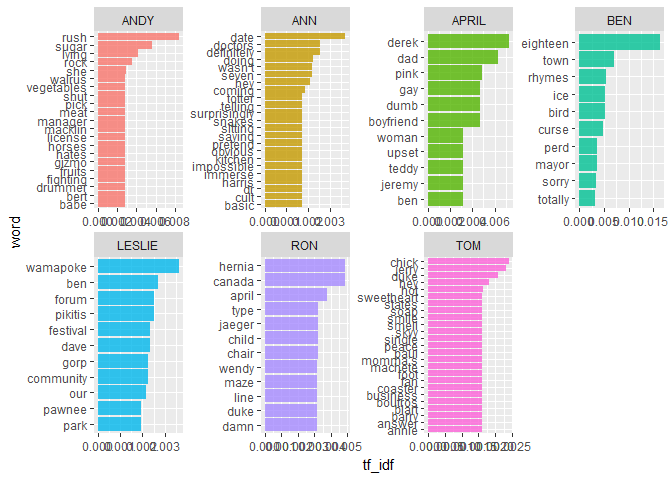Happy Galentine's Day!
Sometimes you dream big, but you just don’t have the data…
I had this plan for text analysis by character from the Parks &
Recreation series to celebrate Galentine’s Day but getting the data was
a struggle. Subtitles are available for pretty much every episode but
those don’t contain data about the character who said the lines. I
needed scripts, which are a bit harder to come by. I found 6 scripts of
episodes on the web from the first 3 seasons in pdf format that were usable. Some pdf’s were image scans so data was not extractable.
That’s not even covering 5% of the series episodes, but let’s use what
we’ve got!
But first, what is Galentine’s day I hear you ask?


On Friday February 13th, the day before Valentine, Leslie Knope from the Pawnee Parks department celebrates Galentine’s day with her… gals.
Extracting the data from pdf
library(pdftools)
library(stringr)
library(dplyr)
library(tidyr)
#getting the data from pdf
pdf_script <- pdf_text("data/parks-and-recreation-3x07-harvest-festival-2011.pdf")
#remove the first two pages that are cover sheets
pdf_script <- pdf_script[3:34]
As per usual, getting the data in good shape took quite a bit of effort and regex-playtime, but as this won’t be very interesting, I will quickly glance past it.
I needed to extract pdf’s 6 times, so I did the first one manually and then turned this into a function: The function does a few things in a row:
- It removes the recurring text on top of the pdfs which contains the episode information
- It extracts only the indented text which is where the actual lines are. Everything else is descriptions of characters/scenes.
- It removes some other text like “ACT ONE”, “END OF SHOW”. It also removes anything between brackets which was often to indicate a character’s reaction like “(shouting)”.
- After moving it into one long vector, I could split the text into lines by character. This was possible because the character’s name was all in uppercase and no other text was.
- And finally moves everything in a dataframe
clean_pr_script <- function(pdf_script, episodeinfo){
indented_text <- pdf_script %>%
#removing the first lines on every page that are just title text
str_replace("PARKS.+\\\r\\n.+10", "") %>%
#extracting on the indented text
str_extract_all(pattern = "\r\n\\s{5,}.+") %>%
unlist()
clean_indented_text <- indented_text %>%
str_replace("(END OF )?COLD OPEN", "") %>%
str_replace("(END OF )?ACT [A-Z]+", "") %>%
str_replace("TAG", "") %>%
str_replace("END OF SHOW", "") %>%
str_replace("\\(.+\\)", "") %>% #removes anything between brackets
str_replace("\r\n\\s+", "") #removes the new line and extra spaces
#pasting into one long text
one_long_text <- paste(clean_indented_text, collapse = " ")
#splitting by speaker
clean_script <- str_extract_all(one_long_text, "[A-Z]{3,}(\\s*\\W*[A-Z]?\\W*[a-z]+\\W*\\d*)+")
clean_script <- unlist(clean_script)
#making a dataframe
script_split <- str_split(clean_script, pattern = " ", n=2)
script_split_t <- purrr::transpose(script_split)
output <- tibble(episode = episodeinfo,
speaker = unlist(script_split_t[[1]]),
text = unlist(script_split_t[[2]]))
mutate_all(output, str_trim)
}
Time to get all of the episode info out: Given that the number of pages, and especially the number of intro-pages varied, I did not do this as part of the function but manually upfront.
pdf_3x07 <- pdf_text("data/parks-and-recreation-3x07-harvest-festival-2011.pdf")
pdf_3x07 <- pdf_3x07[3:36]
script_3x07 <- clean_pr_script(pdf_3x07, "3x07 Harvest Festival")
pdf_3x05 <- pdf_text("data/parks-and-recreation-3x05-media-blitz-2011.pdf")
pdf_3x05 <- pdf_3x05[3:36]
script_3x05 <- clean_pr_script(pdf_3x05, "3x05 Media Blitz")
pdf_2x07 <- pdf_text("data/Parks_and_Recreation_2x07.pdf")
pdf_2x07 <- pdf_2x07[3:41]
script_2x07 <- clean_pr_script(pdf_2x07, "2x07 Greg Pikitis")
script_2x07 <- script_2x07[2:308,]
script_2x07$text <- str_replace(script_2x07$text, "take one.\\s+", "")
pdf_1x02 <- pdf_text("data/parks-and-recreation-1x02-canvassing-2009.pdf")
pdf_1x02 <- pdf_1x02[2:38]
script_1x02 <- clean_pr_script(pdf_1x02, "1x02 Canvassing")
pdf_2x02 <- pdf_text("data/parks-and-recreation-2x02-the-stakeout-2009.pdf")
pdf_2x02 <- pdf_2x02[5:45]
script_2x02 <- clean_pr_script(pdf_2x02, "2x02 The Stakeout")
pdf_2x04 <- pdf_text("data/parks-and-recreation-2x04-practice-date-2009.pdf")
pdf_2x04 <- pdf_2x04[3:36]
script_2x04 <- clean_pr_script(pdf_2x04, "2x04 The Practice Date")
#binding them all together:
script <- bind_rows(script_1x02, script_2x02, script_2x04, script_2x07,
script_3x05, script_3x07)
script
Doing all that will give a dataframe of 1841 lines split by character:
## # A tibble: 1,841 x 3
## episode speaker text
## <chr> <chr> <chr>
## 1 1x02 Canvassing LESLIE Hello, Donna. I have the conference room booke~
## 2 1x02 Canvassing DONNA Yup.
## 3 1x02 Canvassing LESLIE And the large meeting room for tomorrow night?
## 4 1x02 Canvassing DONNA Yes. Stop asking.
## 5 1x02 Canvassing LESLIE Tomorrow night is our very first public forum ~
## 6 1x02 Canvassing TOM Wet Dream.
## 7 1x02 Canvassing LESLIE Really? Okay. Like the proud Wamapoke tribes o~
## 8 1x02 Canvassing ANN Mm. Hearty breakfast.
## 9 1x02 Canvassing MARK Its the most important meal of the day.
## 10 1x02 Canvassing ANN I think lunch is the most important--
## # ... with 1,831 more rows
Featured episodes
I’m on avid reader of Julia Silge’s blog on text analysis and I
noticed her using two functions from a personal package by David
Robinson that are pretty nifty when you want to make ordered faceted
plots with words that appear multiple times.
I did not load the entire package, but just copied those two functions
to use in here:
library(tidytext)
library(ggplot2)
#functions from David Robinson
reorder_within <- function(x, by, within, fun = mean, sep = "___", ...) {
new_x <- paste(x, within, sep = sep)
stats::reorder(new_x, by, FUN = fun)
}
scale_x_reordered <- function(..., sep = "___") {
reg <- paste0(sep, ".+$")
ggplot2::scale_x_discrete(labels = function(x) gsub(reg, "", x), ...)
}
Just a reminder for those who know Parks & Recreation: which episodes are in and what are they about? Here are the top words by episode - in many cases these really are enough to remember what the episode is about.
script %>%
unnest_tokens(word, text) %>%
count(episode, word, sort=TRUE) %>%
bind_tf_idf(word, episode, n) %>%
group_by(episode) %>%
top_n(10) %>%
ungroup() %>%
mutate(word = reorder_within(word, tf_idf, episode)) %>%
ggplot(aes(word, tf_idf, fill = episode)) +
geom_col(alpha = 0.8, show.legend = FALSE) +
facet_wrap(~ episode, scales = "free_y", ncol = 3) +
scale_x_reordered() +
coord_flip()

Text analysis for the main characters
I wasn’t really interested in episode descriptions, but in the
characters - who says what a lot in comparison to others?
The td_idf scores show some nice things: Leslie obviously is the most
community orientied with words like: festival, forum, our, community,
Pawnee and park, but also arch nemisis Greg Pikitis features.
In the early seasons Ben still gets a lot of explaining to for when he
became mayor at 18 and building Ice Town.
But although not entirely readable, Andy’s set of words is a true star
for me - what a set of random words: sugar rush, rock, walrus,
vegetables?
script %>%
filter(speaker %in% c("LESLIE", "TOM", "ANN", "RON", "APRIL", "BEN", "ANDY")) %>%
unnest_tokens(word, text) %>%
count(speaker, word, sort=TRUE) %>%
bind_tf_idf(word, speaker, n) %>%
group_by(speaker) %>%
top_n(10) %>%
ungroup() %>%
mutate(word = reorder_within(word, tf_idf, speaker)) %>%
ggplot(aes(word, tf_idf, fill = speaker)) +
geom_col(alpha = 0.8, show.legend = FALSE) +
facet_wrap(~ speaker, scales = "free", nrow = 2) +
scale_x_reordered() +
coord_flip()

What about sentiments? Who is the most positive person in the bunch?
ratio_posneg <- script %>%
unnest_tokens(word, text) %>%
inner_join(get_sentiments("bing"), by="word") %>%
count(speaker, sentiment, sort=TRUE) %>%
spread(sentiment, n) %>%
mutate(total = positive + negative, ratio = positive/negative) %>%
filter(total > 12, speaker != "GREG") %>%
mutate(speaker = reorder(speaker, ratio))
ggplot(ratio_posneg, aes(x= ratio, y=speaker)) +
geom_point(size = 3, col = "cadetblue4") +
labs(title = "Characters according to their positive/negative words ratio",
x = "Ratio positive to negative words using Bing lexicon",
y = "Character")

Houston, we sure have no data interpretation issues here: by a long, long mile, the winner is…

Leslie-Knope-style compliments
There was so much more I wanted to do, but the data was really limited.
Strangely enough, none of these episodes even contained a
Leslie-Knope-style compliment to Ann!
Here are all Leslie’s lines featuring the word ‘Ann’.
script %>%
filter(speaker == "LESLIE") %>%
filter(str_detect(text, pattern = "Ann")) %>%
pull(text)
## [1] "Going door-to-door, talking to Anns neighbors, whipping them into an excited, positive frenzy, and getting them to come to the forum. Canvassing!"
## [2] "Exactly. Teams are me and Ann, Tom and Mark. And were gonna win!"
## [3] "Ann, wait--"
## [4] "Never wish that. Ann, the whole point of democracy is decisions are made by the people, as a group. This is a gift, to be able to talk to them. A gift from the founding fathers."
## [5] "Hello there! Im Leslie Knope, from the Parks Department, and this is my colleague Ann."
## [6] "Jinx! No backsies. We all had the same idea. Mark and Ann -- power team."
## [7] "I just have to prove to Ann that its about perseverance. All I need is one strong Ill be there. The next person I meet, Im converting."
## [8] "Mark, Ann?"
## [9] "Ann, please. It is absolutely fine. The most important thing to me is our friendship. You know my code -- hoes before bros."
## [10] "You know Anns name."
## [11] "Ann is great. But I bet she misses you."
## [12] "So, do you... spy on Ann from the pit?"
## [13] "Im not sure thats healthy. I mean, youre not with Ann anymore. She may even be dating other guys."
## [14] "I hope Mark and Ann got home okay. I mean, I hope Ann is home, and okay, and Mark is also okay, in his home--"
## [15] "Oh, thats a way better idea. Awesome. Thanks, Ann. Oh God -- Im getting so nervous."
## [16] "Ann is so awesome. Im lucky to have a friend who would spend her night off pretending to treat me so poorly."
“Ann is great”, “Ann is awesome” - yes, those are compliments, but this is not what Leslie is known for!
So I will leave you with a few quotes I got from this website
“Ann, you beautiful tropical fish.”
“Oh, Ann, you beautiful, rule-breaking moth.”
“Ann, you are such a good friend, you’re a beautiful, talented, brilliant, powerful musk-ox. Thank you, ox.”
“Ann, you cunning, pliable, chestnut-haired sunfish.”
“Oh, Ann. You beautiful, naïve, sophisticated newborn baby.”
“Ann, you poetic, noble land-mermaid.”
Happy Galentine’s Day, gals!

Keep on reading…
More parks and recreation R-stats post:
- Maëlle Salmon’s brilliant Galentine’s Day card generator with some Leslie-Knope-worthy compliments
- Maëlle Salmon’s post on Parks and Recs IMDB ratings and worldcloud
- … (and hopefully many more future Parks & Recreation posts)

